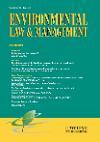ENVIRONMENTAL LAW AND MANAGEMENT - VOLUME 32 - ISSUE 6

Editorial
Is the new nuclear needed?
ZOE STOLLARD
Construction Partner, Browne Jacobson LLP, Birmingham
Articles
Regulatory appeals in Scotland: patterns behind the patchwork
TIM MATTHEWS
COLIN T REID
University of Dundee
Against the background of a fragmented and inconsistent pattern of environmental regulatory appeals in Scotland, the desirability of an environmental court or tribunal is coming under scrutiny. This article examines the structural choices that have already been made and the potential structure, functions and procedure of a future specialist court.
The Bonn Climate Conference: the quiet before the storm
ALEXIOS ANTYPAS
BROOKE MOORE
Department of Environmental Sciences and Policy, Central European University
The 2023 conference was marked by disagreement on difficult issues, especially around money and historic responsibility. Negotiations at the next COP are likely to have difficulty finding common ground on such issues as loss and damage funding, not to mention the proposed fossil fuel phase-down.
Case Commentaries
Confirming the Ultra Low Emission Zone: another step towards cleaner air for London
JO SELLICK
JASON LOWTHER
University of Plymouth
Four London Borough Councils brought an action challenging the Mayor of London’s decision to expand the Ultra Low Emission Zone (ULEZ) to the whole of Greater London. The extension of ULEZ was held to be intra vires and all the grounds put forward by the Councils were comprehensively rejected.
Supreme Court rules on ‘continuing nuisance’ in Jalla v Shell
BEN PONTIN
Cardiff University
Following the largest oil spill in Nigeria’s history in 2011, residents of the Niger Delta complained of interference with rights to the use and enjoyment of land protected by private nuisance. This analysis focuses on the difficulties arising from the action brought before the English courts between 2017 and 2020, including the definition of ‘continuing nuisance’, which culminated in 2023 in an important Supreme Court ruling.
The Batteries Regulation enters into force: what does this mean for the med tech industry?
FABIEN ROY
ANASTASIA VERNIKOU
Hogan Lovells, Brussels
The Batteries Regulation establishes a broad range of obligations for economic operators placing batteries on the EU market. Since many medical devices incorporate portable batteries, the industry will face further regulation besides the already complex rules applicable to the devices themselves.
Greenwashing: the story so far
CAROLINE GREENWELL
PETER CARLYON
OLIVIA GRAY
Charles Russell Speechlys LLP, London
Pressures to achieve net zero are leading some companies to engage in greenwashing, thus highlighting the need for regulation. The authors examine UK and EU regulation and offer guidance on the correct formulation of environmental claims.
Strategic Issues – Scotland
Environmental governance –A Human Rights Bill for Scotland
Circular Economy (Scotland) Bill –National Planning Framework 4
SARAH HENDRY
Dundee Law School & UNESCO Centre for Water Law Policy and Science, University of Dundee
News reports
England –United Utilities Water Limited fined £800,000 for taking too much water from the environment
Netherlands – Dutch Council of State green-lights Porthos project
JASPER VAN UDEN
De Brauw Blackstone Westbroek N V Amsterdam
CAROLINE COLLISTON
DWF LLP, Edinburgh
Scotland –Navigating the Low Emission Zones in Scotland
